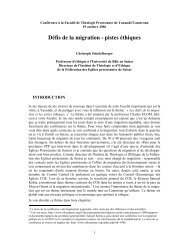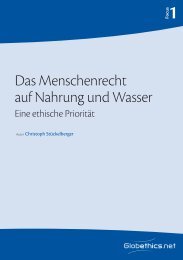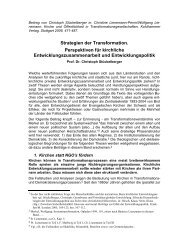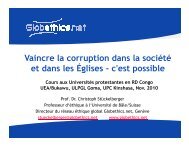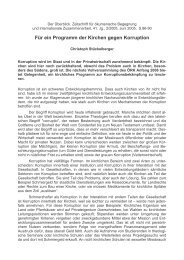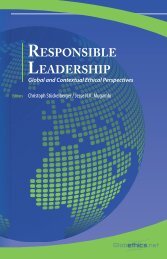BREAK THE CHAINS OF OPPRESION AND THE YOKE OF ...
BREAK THE CHAINS OF OPPRESION AND THE YOKE OF ...
BREAK THE CHAINS OF OPPRESION AND THE YOKE OF ...
Create successful ePaper yourself
Turn your PDF publications into a flip-book with our unique Google optimized e-Paper software.
cove nanTi ng<br />
Western neighbor countries. Due to their situation as a minority church and<br />
their size they simply do not have the same capacities to engage in the discussion<br />
sparked in Accra to the same extent others might do. Besides this reason located<br />
on a mere organizational level two further reasons shall be named which voice<br />
concerns that should not be overheard in the ecumenical discussions. Post-communist<br />
countries in Europe have benefited largely from the Eastern European<br />
expansion of the European Union accompanied by the economic system. This<br />
surely might be a reason for the skepticism of a fundamental critic raised by concept<br />
of ‘empire’. 1 Closely connected to this reason is a second reason located in<br />
the heart of the Accra-Confession often rather regarded as a ‚declaration’. It is the<br />
“ideological color” and political „overtone” of the semantics used in the text. The<br />
responses of the churches here voice a concern deriving from their experience of<br />
recent history. Having suffered greatly under the actual existing communism<br />
there is a high sensitivity concerning any kind of political contextualization of<br />
the Gospel and especially any kind of „communist” reading of it. In spite of<br />
these general and theological concerns that have been voiced concerning the “Accra-Declaration”<br />
and their perception, the general issue of justice in economy<br />
and on earth is widely shared and there have been various implementations of<br />
the covenanting process. Therefore we find astonishing work and projects being<br />
done there, dealing with the particular problems globalization has imposed on<br />
the people in this part of Europe. Due to the current economic downturn the<br />
“young” European economies in the East are severely suffering form the implications<br />
of global economy and their by comparison smaller influence on society<br />
and politics.<br />
A last perspective should not be lost out of sight since it also reflects the plurality<br />
and especially �the inequality � �of regions and �countries �on<br />
this continent: a few<br />
sister-churches in the south east were merely available by contemporary communication<br />
such as email and fax.<br />
After this first step of a more or less structural analysis it is possible to state a<br />
clear tendency within this common effort of the covenanting for justice process.<br />
The churches in countries with the largest economies in Europe have embraced<br />
the issue profoundly. In other words: especially in the context of societies, which<br />
under a simplified perspective could be described as the actors among the globalizing<br />
world, many different projects were launched on national, regional and<br />
1 Especially in the European context the concept of ‘empire’ has been broadly discussed<br />
and the standpoints have been highly controversial. However the Globalization-Project<br />
(cf. Chapter 12) and profound analysis (cf. Wasserloos-Strunk, Chapter 8) have lead to<br />
a fruitful progress in the understanding by keeping all sides of the discussion from<br />
falling back into old paradigms. Cf. also the Message of the Global Dialogue Meeting in<br />
Johannesburg 2009.<br />
��������������������������������������������<br />
� � � � ��������������������<br />
�<br />
– EUROPE’S ROAD TO JUSTICE – 53



